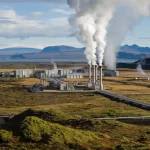Despite strong evidence that human activity played a role in catastrophic weather events, and the onset of the fuel crisis sparked by the war in Ukraine, greenhouse gas emissions have continued to rise. Nevertheless, the United Nations has kept the climate emergency high on the international agenda, reaching major agreements on financing and biodiversity.
When the United Nations Climate Conference (COP26) concluded in Glasgow, at the end of 2021, none of the attendees could have imagined that the war in Ukraine would lead to disruption in the global economy, persuading many countries to suspend their commitments to adopting low-carbon economies, as countries rushed To reduce its dependence on Russian oil and gas supplies, and to secure fossil fuel supplies elsewhere.
Meanwhile, a host of studies point to the continuing global warming, humanity’s failure to cut carbon emissions, and to deal with the existential threat of the climate emergency.
Nevertheless, the United Nations continued to lead the slow, painstaking but essential task of concluding international climate agreements, with sustained pressure on major economies to make greater efforts to reduce fossil fuel use, and support for developing countries, whose citizens bear the brunt of droughts, floods and extreme weather caused by climate change. Man-made climate.
Record heat waves, droughts and floods
The World Meteorological Organization (WMO) has issued a series of grim details throughout the year.
A January study concluded that 2021 was among the seven warmest years on record.
And when record heat waves were recorded during the summer in many European countries, the agency warned that we should get used to more heat in the next few years, while Africa can expect an exacerbation of the food crisis centered in the Horn of Africa, which has led to the displacement of millions of people. : Four out of five countries on the continent are likely to have no sustainably managed water resources by 2030.
While some areas suffered from water shortages, others experienced catastrophic floods. In Pakistan, a national emergency was declared in August, following floods and torrential landslides caused by monsoon rains that submerged about a third of the country and displaced tens of millions.
Unprecedented flooding in Chad affected more than 340,000 people in August, and in October, UNHCR announced that some 3.4 million people in West and Central Africa needed assistance amid the worst floods in a decade.
“imaginary” addiction to fossil fuels
In its October Bulletin on Greenhouse Gases, the World Meteorological Organization identified record levels for the three main gases – carbon dioxide, nitrous oxide and methane – which saw the biggest annual jump in concentrations in 40 years, identifying human activity as a major factor in the climate. variable.
Yet despite all the evidence of the urgent need to transition to a low-carbon economy, the world’s major economies have responded to the energy crisis triggered by the war in Ukraine by reopening aging power plants and searching for new oil and gas suppliers.












